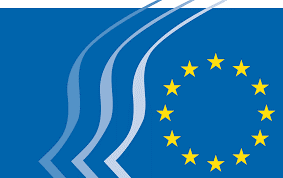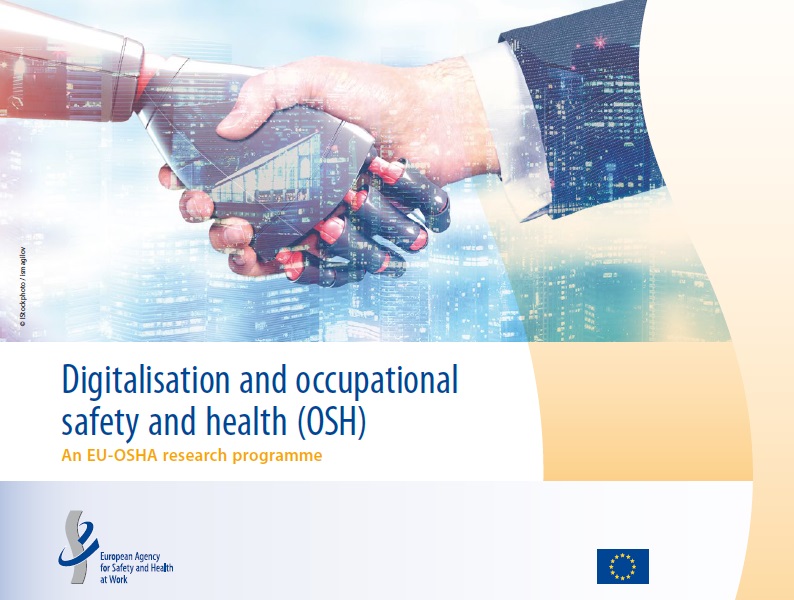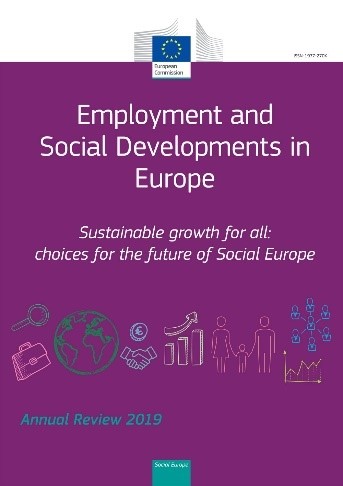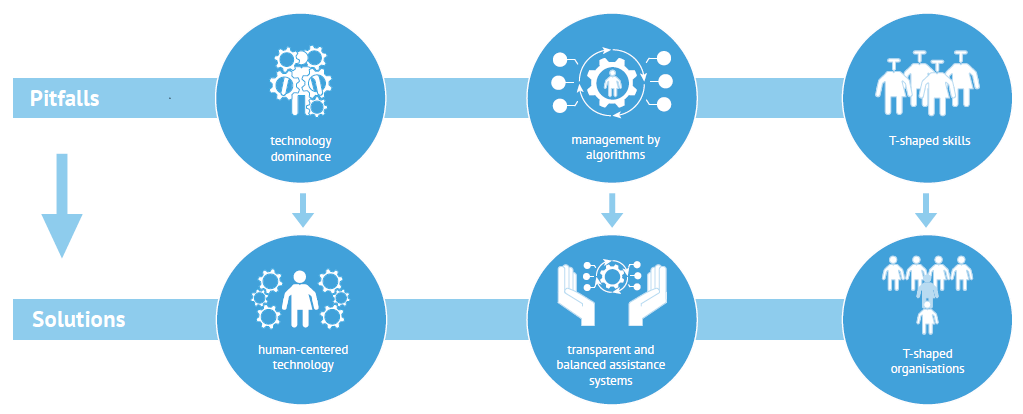High-level support for workplace innovation
 Frank Pot
Frank Pot
Senior Research Fellow, TNO
The debates on digital transformation and the future of work reveal risks and opportunities. Will part of the workforce be left behind or will everybody acquire new skills? Can we create more high-quality jobs or will job polarisation become even stronger? It appears that workplace innovation is able to contribute to achieving positive answers – an assertion recently supported by a number of high-level groups and institutions in the EU.
The European Economic and Social Committee
The EESC is a consultative body that gives representatives of Europe’s socio-occupational interest groups (employers’ associations, trade unions) and others (such as NGOs) a formal platform to express their points of view on EU issues. Its opinions are addressed to the Council, the European Commission and the European Parliament. It thus has a key role to play in the Union’s decision-making process. Its ‘own-initiative opinion’ on ‘innovative workplaces’ of 2011 (rapporteur Leila Kurki) contributed to the adoption by the European Commission in 2012 of ‘workplace innovation’ in EU industrial and innovation policy.
Recently the EESC published a new ‘own-initiative opinion’ on ‘Social dialogue for innovation in digital economy’ (rapporteur Jukka Ahtela). One of the recommendations is to continue promoting workplace innovation:

“At national level initiatives by social partners to enhance the productivity and well-being of workers at workplace level are a promising method, that should be promoted in a wider European context. In this regard the EESC welcomes the initiatives and research of Eurofound and the European Workplace Innovation Network and proposes that the EU take action to develop the dialogue between social partners and other stakeholders in the context of participative approaches to promote workplace innovation” (…)
“The EESC endorses the view that the probability of innovation is boosted when strong work organisation structures are combined with various forms of increased employee participation within a solid legal and contractual framework. With this aim collective representation needs to be increasingly accompanied by a more inclusive, reflective and democratic dialogue in work structures and methods. The importance of training in social dialogue for management in order to adapt management methods in the new context should equally be taken into account” (EESC, 2019, p. 4).
European Agency for Safety & Health at Work (EU-OSHA)
The European Agency for Safety & Health at Work published a study, Foresight on new and emerging occupational safety and health risks associated with digitalisation by 2025 (EU-OSHA, 2018), in which workplace innovation is used as an option to construct scenarios. In a recent Discussion Paper, EU-OSHA uses the concept of ‘social innovation in the workplace’, meaning non-technical innovations that emphasise good quality jobs and employee participation. The argument is that the fourth industrial revolution should go together with social innovation in the workplace (EU-OSHA, 2019).

High-Level Expert Group ‘Digital Transformation and Labour Markets’
A high-level expert group was established by the European Commission recently to study the impact of digital transformation on EU labour markets and to develop recommendations. The ten independent experts emphasised, amongst other things, ‘creating innovative learning environments’, ‘reinvigorating social dialogue’ and ‘new labour relations’ (High-Level Expert Group, 2019).
Industry 2030 High-Level Industrial Roundtable
In December 2017 the European Commission established the ‘Industry 2030 High-Level Industrial Roundtable’ with 8 independent experts and 12 representatives of employers’ associations and trade unions. They agreed on the following Vision for 2030:
“In 2030, European industry will be a global leader that will responsibly deliver value for society, the environment and the economy. The future European industrial model will successfully connect economic progress with major environmental and societal challenges. Continuously progressing and benefiting from strong democratic principles, freedom, unity in our diversity and the rule of law, by 2030, the European Union will successfully become an innovative, sustainable, competitive and human-centred collaborative economy in an increasingly populated, resource constrained and interconnected world. We will invest heavily in cutting-edge and breakthrough technologies, respect planetary boundaries and biodiversity, take leadership in smart European and global alliances, reinforce our global competitiveness and, last but not least, invest in current and future generations by addressing key societal challenges, providing innovative jobs in all regions and investing in new skills. This is how we, members of Industry 2030 high level industrial roundtable, envision Europe in 2030 (Industry 2030 High-Level Industrial Roundtable, 2019, p. 5).
Amongst the opportunities for Europe, the following are mentioned:
- “Europe has more experience in social dialogue than other regions in the world and can use that to shape industrial transformation to achieve co-ownership. It can build on this expertise to co-create future industrial policy and adapt it to the needs of a changing world and society.
- The human-centred design of technology, while breaking down the silos between technology and society and democratizing technology development with more bottom-up initiatives, could stimulate responsible disruptive innovation, e.g. the European way of creating intelligent machines based on collective human-machine dynamism provides an opportunity to enhance human labour with new robot and AI tools instead of substituting human labour with robots” (p. 11).
Finally, one of the recommendations for building an enabling environment for more sustainable business activities is to:
“Promote the development of workplace innovation and other modern practices, which influence both wellbeing and economic performance of companies” (p. 35).
DG Employment, Social Affairs & Inclusion
DG EMPL added to the chorus of high-level opinion in favour of workplace innovation by concluding:
“Robust economic expansion in the EU cannot be sustained without higher total factor productivity growth, which relies more on the efficient use of productive factors, rather than just expanding their use. Total factor productivity thrives in Member States and regions with strong labour market institutions and in firms that invest in workers’ training and innovative capital and processes. Policies that help to develop human capital and facilitate workplace innovation are most effective in increasing productivity in the long term, provided labour markets do not discriminate and firms can access the necessary capital” (European Commission, 2019a, p. 28).

European Commission Europe 2020
The importance of job quality is also underlined in the conclusions of the evaluation of the Europe2020 Strategy. It argues that the employment policy was rather successful but “cannot encompass all the aspects of the changing workplace, in which the quality of jobs matters as much as their availability. In the future, greater attention should be given to the aspect of the quality of work” (European Commission, 2019b, p. 7).
From Recommendation to Policy and Action
These high-level recommendations seem to reflect high levels of agreement about the positive impact of workplace innovation. However, the transposition of these recommendations to EU and national policies is not that self-evident. In particular the employers’ representatives emphasise that work organisation and technology are their responsibility. They decide when and how workers will be involved. Arrangements with trade unions and/or governments do exist but are exceptional.
Where joint programmes of social partners are difficult to achieve (at the moment), the need for government initiatives seems obvious. Good examples are the ongoing programmes in Germany, Basque Country and Scotland. In Finland the ‘Business, Productivity and Joy at Work’ programme (2012 – 2018) has been succeeded by the ‘Minimalist Organizational Design project’ (MODe) which studies what kind of organisational models make employees’ self-management possible.
The lobbying continues.
European Agency for Safety and Health at Work (EU-OSHA) (2018). Foresight on new and emerging occupational safety and health risks associated with digitalisation by 2025. Bilbao: EU-OSHA.
European Agency for Safety and Health at Work (EU-OSHA) (2019). The fourth industrial revolution and social innovation in the workplace. (Discussion Paper). Bilbao: EU-OSHA.
European Commission (2019a). Employment and Social Developments in Europe 2019, Sustainable growth for all: choices for the future of Social Europe. Luxembourg: Publications Office of the European Union.
European Commission (2019b). Assessment of the Europe 2020 strategy. Joint report of the employment committee (EMCO) and social protection committee (SPC). Luxembourg: Publications Office of the European Union.
European Economic and Social Committee (2019). Social dialogue for innovation in digital economy[own-initiative opinion SOC/577] Brussels: EESC.
High-Level Expert Group (2019). The Impact of the Digital Transformation on EU Labour Markets. Luxembourg: Publications Office of the European Union.
Industry 2030 high-level industrial roundtable (2019). A vision for the European industry until 2030. Brussels: European Commission.
Share This Story!

European Workplace Innovation Network (EUWIN)
EUWIN was established by the European Commission in 2013 and is now entirely supported by contributions from an international network of partners co-ordinated by HIVA (University of Leuven). EUWIN also functions as a network partner for the H2020 Beyond4.0 project.
Contact: Workplace Innovation Europe CLG (contact@workplaceinnovation.eu).
